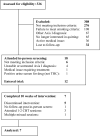Cognitive behavioral therapy and the nicotine transdermal patch for dual nicotine and cannabis dependence: a pilot study
- PMID: 23617864
- PMCID: PMC3641687
- DOI: 10.1111/j.1521-0391.2012.12007.x
Cognitive behavioral therapy and the nicotine transdermal patch for dual nicotine and cannabis dependence: a pilot study
Abstract
Background and objectives: We assessed the feasibility of a new cognitive behavioral therapy (CBT) manual, plus transdermal patch nicotine replacement therapy (NRT), to treat co-occurring nicotine and cannabis dependence.
Method: Seven of 12 (58.3%) adults with DSM-IV diagnoses of both nicotine and cannabis dependence completed 10 weeks of individual CBT and NRT.
Results: Participants smoked 12.6 ± 4.9 tobacco cigarettes per day at baseline, which was reduced to 2.1 ± 4.2 at the end of treatment (F[5] = 23.5, p < .0001). The reduction in cannabis use from 10.0 ± 5.3 inhalations per day at baseline to 8.0 ± 5.3 inhalations per day at 10 weeks was not significant (F[5] = 1.12, p = .37). There was a significant decrease from the mean baseline Fagerstrom Test for Nicotine Dependence scores at weeks 4, 6, 8, and 10 of treatment (F[4] = 19.8, p < .001) and mean Client Satisfaction Questionnaire scores were uniformly high (30.6 ± 1.9).
Conclusions and scientific significance: A CBT plus NRT treatment program significantly reduced tobacco smoking but did not significantly reduce cannabis use in individuals with co-occurring nicotine and cannabis dependence. There was no compensatory increase in cannabis use following the reduction in tobacco smoking, suggesting that clinicians can safely pursue simultaneous treatment of co-occurring nicotine and cannabis dependence. The intervention was well-liked by the 7 of the 12 enrollees who completed the study.
Copyright © American Academy of Addiction Psychiatry.
Figures




References
-
- Schorling JB, Gutgesell M, Klas P, Smith D, Keller A. Tobacco, alcohol, and other drug use among college students. J Substance Abuse. 1994;6:105–115. - PubMed
-
- Stinson FS, Ruan WJ, Pickering R, Grant BF. Cannabis use disorders in the USA: prevalence, correlates and co-morbidity. Psychol Med. 2006;36:1447–1460. - PubMed
-
- Ranney L, Melvin C, Lux L, McClain E, Lohr KN. Systematic review: smoking cessation intervention strategies for adults and adults in special populations. Ann Intern Med. 2006;145:845–856. - PubMed
-
- Crippa JA, Zuardi AW, Martin-Santos R, et al. Cannabis and anxiety: a critical review of the evidence. Hum Psychopharmacol Clin Exp. 2009;24:515–523. - PubMed
Publication types
MeSH terms
Substances
Grants and funding
LinkOut - more resources
Full Text Sources
Other Literature Sources
Medical

